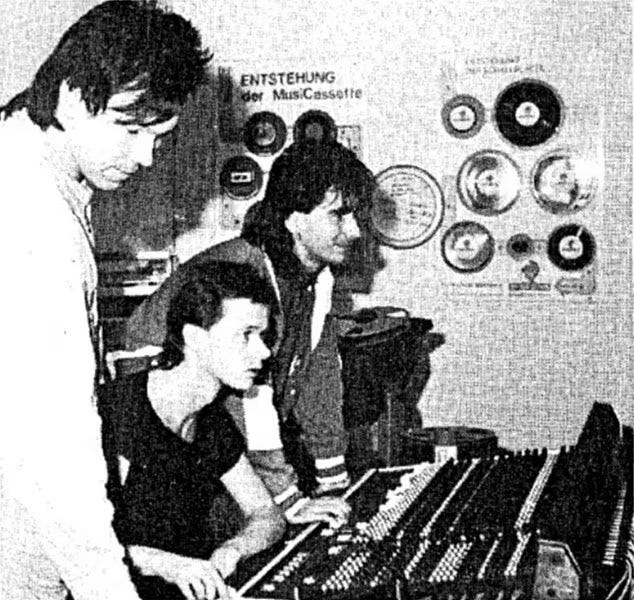Curiosity Ends the Search for The Most Mysterious Song on the Internet
How an Obscure ’80s Synth-Pop Track United Online Sleuths in a Decade-Long Hunt for Answers—and What Its Discovery Means for Our Age of Curiosity

We live in an age of technology and science that demands proof, and yet we desire mystery. — Mother Angelica
We dance between worlds. One is all around us, tickling at our senses, an ever-shifting alliance of atoms and electrons. A physical world encompassing us in myriad forms: trees and animals, cities and mountains, oceans that stretch for eons, and then the great cosmos and beyond.
The other, just as vast—a system of interconnected networks, invisible streams traversing the globe, firing off on one another like neurons piloting pathways in a brain. It’s an omnipresent architect, transferring information across a broad spectrum of devices, a god in the wires.
The amalgamation of these worlds has had consequences, good and bad, intended or not. What was once too large to comprehend is now small and connected. The world was round; now it’s flat. It’s all been seen and heard; the mysteries scrubbed away. Anything you want to know, want to see, want to look at, or listen to is at your fingertips for the simple fact it’s there.
Curiosity should and always is quenched—until it’s not.

An Enigmatic Anthem: How the Most Mysterious Song on the Internet Became Digital Folklore
And so began the tale of the Most Mysterious Song on the Internet, a curiosity odyssey that appeared to have no end in sight. Born somewhere in the early ’80s, it touched all three ages of the digital revolution with its supposed genesis merged in analog on a cassette between a German radio show and a tape deck. Then, it disappeared, only to be reborn in digital form in 2007 by amateur music sleuths congregating on Reddit and Discord. The song’s mystery surfaced in both print and visual media, with a Rolling Stone write-up and multiple episodes dedicated to the hunt on the popular YouTube series Tales from the Internet. This song endured the fall of communism, the rise of global terrorism, and seven different U.S. presidents to become internet folklore.
And it’s easy to understand the allure. Upon first listen, it all seems so familiar—the opening riff, its moody aesthetic, the deep, monotonous vocal tone that never wavers, even as the verse shifts to the chorus; helpless against the irresistible call of glam-rock. Close your eyes, and you know the song—we can almost see the band and their video: sleeveless metal-clad vests over bare chests, leather pants tight like gloves, and kink-less high hair blending into the onyx of a clear night sky. Their faces remain stoic, as if even a slight smile would shatter their expressions. The band swallowed up into the cover of a mist-filled cobblestone road, a backdrop fit for Jack the Ripper.
But until now, no video existed. There were no faces to match the music, no album to find, no artwork folded in a sleeve, and no Wikipedia page continually updated by devoted fans. Besides “The Most Mysterious Song on the Internet” moniker, other devotees had christened it with fitting names such as “Like the Wind.” Yet it could’ve just as easily been named “Check It In, Check It Out” or “Blind the Wind,” based on fan-interpreted lyrics. But at that time, no one knew its true name or who created it.
“Cassette 4” is where the tale inadvertently takes off.
The story begins with Darius S., who recorded the song from a German public radio station called NDR 1. Years later, he uploaded it to his computer, and in 2007, his sister shared a small digitized version on a Canadian music site, spiritofradio.ca. From there, the song began to bounce around the web, gaining sporadic attention. But the real surge of curiosity came in 2019, when a Brazilian teenager named Gabriel da Silva Vieira started searching for the song's origin. Gabriel uploaded the snippet to YouTube and shared it across various music-related Reddit communities, giving the song a life of its own online. Since then, it has become a bit of an internet phenomenon, with YouTube videos dissecting it and even major publications like Rolling Stone dedicating write-ups to its mystery.
The real story here isn’t necessarily about the song itself. It’s enjoyable, yes, depending on the ear, but it’s not groundbreaking—certainly not unlike its synth-pop contemporaries of the era. Yet, as Nicolás Zúñiga, a label owner and fan of the song, put it, “It’s exactly the fact that people cannot locate it in four seconds that makes it interesting.”
Zúñiga’s reasoning strikes a chord, especially in a world where technology provides instant access to almost any information. For Millennials and Gen Z, the expectation of immediate answers is second nature. Technology has redefined curiosity itself ever since June 29, 2007, when Steve Jobs strolled onto that stage and introduced the original iPhone, shattering the past like particles dissolving in Thanos’ wake.
The Most Mysterious Song on the Internet tapped into something deeper, something that isn’t apparent at first glance: a sense of community and the appeal of mystery itself. It’s a pull that unites people across platforms and generations, revealing that even in an era of digital omniscience, there’s an intrinsic human need to chase the unknown.
What Drives the Search? Humanity’s Innate Curiosity
It’s no accident that The Most Mysterious Song on the Internet ignited such an intense search, inspiring hundreds of people to sift through archives, decode accents, and hypothesize about long-forgotten bands. At its core, this drive is powered by an essential human trait: curiosity.
Psychologists often describe curiosity as a foundational part of our nature. It’s a trait woven into our evolutionary history, pushing us to explore, learn, and solve. Embedded in our genetic code, from our earliest ancestors tracking animal migrations to scientists today pushing the boundaries of artificial intelligence, curiosity has always been humanity’s silent partner. A relentless drive fuels everything from survival to artistic pursuits, and it’s what propels people to keep chasing answers, even when they’re buried beneath layers of obscurity.
The song hits that primal nerve—a magnetic pull we feel toward the unknown—what some call the “knowledge gap.” It’s that sense of a missing piece, just out of reach, like a half-formed memory we can’t quite bring into focus. When a question hangs in the air, unsolved, it becomes an itch we’re driven to scratch, a puzzle we can’t leave unfinished. This gap isn’t just a void; it’s a quiet tension, a hum beneath the surface demanding resolution. It fuels our obsession to know, to fill in the blanks, to draw every last detail into the light—an urge to make sense of a world that perhaps was never meant to be fully known.
Sometimes, this urge to fill the gap veers off into the realm of speculation, even conspiracy, as narratives swell to fill the void. The song's theories have run the gamut—from whispers that it could've been an unreleased track by a major band like Depeche Mode, to the idea that it was the work of a well-known musician hiding behind a pseudonym. Some fans even entertained the possibility that it had “slipped” through from an alternate dimension where it was once popular. And in the truly wild corners of speculation, there was talk of the song as a Cold War experiment—a psychological weapon crafted to test music’s effect on mood or memory.
The brain loves a good chase; setback after setback, we were still drawn to each glimmer of discovery, every faint lead releasing just enough dopamine to keep our junkie minds craving the next hit, driving us forward—even as the real answer slipped further out of reach.
The Collective Hunt and the Final Revelation: How the Reddit Community Organized a Digital Quest and Pinpointed the Internet's Most Elusive Song

After seventeen years of scouring every corner of the endless internet, the community of digital detectives on Reddit had become a formidable, organized force. The mystery was nearing the end of its second decade, leads running dry, theories collapsing. Yet, they pushed forward, gripped by the mission—even if that mission felt like Sisyphus staring down the mountain, bracing to push the boulder up once more.
They’d zeroed in on Hörfest, an annual German music festival from the ’80s where obscure bands performed before promptly vanishing back into the ether. The plan was as daunting as it was simple: each weekend, a new list of Hörfest bands would drop, and the sleuths would dive in, sifting through names and archives, hoping for a match. It was like panning for gold, one grainy recording at a time.
Then, in the thick of this monotonous assignment, came the break they’d been waiting for. A Redditor named marijn1412 unearthed a buried article in Nordwest Zeitung, a German regional paper from 1984. The article featured a band called FEX, who had recently won a talent contest in Bremen. And there it was—the band’s style was described as “Rock with Wave and Pop influences,” an uncanny echo of the synth-pop tones of the mystery song. One name in the article stood out: Michael Hädrich, a member of FEX who had also been involved with a band that performed at Hörfest.
The trail was heating up. With nothing to lose, marijn1412 managed to contact Hädrich and inquired if he still had any recordings from those years. Days later, the response arrived—Hädrich sent a set of tracks recorded with FEX, and among them was Subways Of Your Mind, a pristine, full version of the song that had haunted listeners for decades.
After years of obsessive speculation, countless dead ends, and the intoxicating pull of the unknown, the mystery was finally unraveled. The Most Mysterious Song on the Internet now had a name, a band, and a rightful place in music history—a testament to the relentless curiosity of a community that turned over every stone, refusing to let the unknown slip away.
After the Chase: The Bittersweet Aftermath of a Solved Mystery?
On November 7, 2024, Kiel, Germany felt cloaked in a kind of quiet heaviness. The sky hung low, thick with clouds, casting everything in a muted gray. Temperatures hovered just above freezing, a steady chill pressing in, seeping through coats and layers.
The scene felt frozen in time, like a pause before something unseen. It was the kind of day where sound travels differently, muted, hushed—where the world feels just a little further away. A fitting feel as three of the four original members of the band FEX, Hädrich, Rückwardt and bassist Norbert Ziermann, came together to perform the song for the German radio station NDR 1 Welle Nord.
It had been 40 years since the band played the song, and they had something special for the occasion—an acoustic rendition, one which strips away the enigmatic synths and faint echoes, revealing a raw, almost vulnerable melody, giving the song an entirely new feel. The chords, laid bare and unembellished, carry an evocative simplicity, while the vocals—deep, steady, and unpolished—add a subtle intimacy.
When a mystery is solved, it often brings the rawest of emotions—relief, satisfaction, maybe something more. The answer can feel like a reward, a validation of all the time, energy, and wonder invested. It can bring a sense of closure, a tidy ending to an open loop that has consumed countless hours.
Yet, the end of a mystery can also carry a strange sense of emptiness. The thrill of the search, the community it built, and the constant lure of new clues are gone. The discovery closes off the story, transforming a living puzzle into something concrete, and that transition can feel oddly bittersweet. For some, the journey itself is more fulfilling than the destination—the chase, the theories, the "what ifs" that colored every step along the way.
As the band played on without the layers of production, the song’s structure felt spacious, its rhythm hypnotic, as if it’s inviting listeners to focus on every strum, every pause. There was an eerie warmth to it, a melancholic nostalgia that feels like a long-forgotten memory coming back into focus—amplifying the song’s haunting quality, giving it the timeless, ghostly allure that captured so many in its enigma.
What lies ahead for the band, the community of dedicated followers, and the new listeners sure to cling to this once-in-a-lifetime happening—well, no one knows. And so a new curiosity begins.


